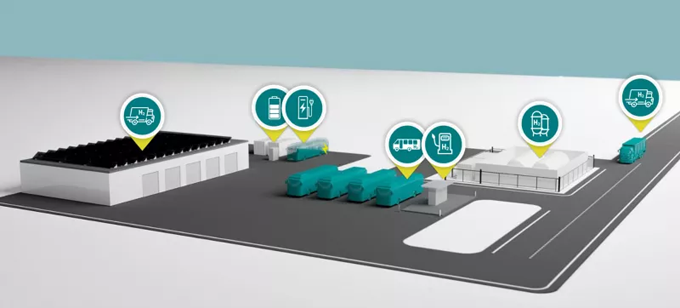The City of Oulu and Energy Source Finland have reached an agreement to build a hydrogen production plant and a hydrogen refueling station

A preliminary concept image of what a possible hydrogen production plant and a hydrogen filling station could look like
Energiequelle has received planning approval for its Oulu Green Hydrogen Park project. It is the company's first public hydrogen project in Finland and is to be developed in the city of Oulu, 600 km north of Helsinki. The first phase of the project includes the construction of a hydrogen production facility with a maximum capacity of five MW and a hydrogen refueling station for buses and heavy-duty vehicles.
"The current planning approval is the first step toward concrete investment decisions. Such large-scale projects require careful and time-consuming planning and studies. The first phase is scheduled to be completed by 2028," commented Karl Schultheis, Head of Business Development at Energiequelle Finland.
In the next phase, the capacity of the hydrogen production plant is planned to be increased to 10-50 MW. Once the necessary infrastructure is in place, hydrogen exports could begin via the planned pipeline to the Port of Oulu. In the third phase, production would be further increased by an additional capacity of 100-500 MW. The final schedule and full size of the second and third phases of the project depend heavily on the market situation and available infrastructure at the selected new site in Pyyryväinen.
The City of Oulu has reserved three new hydrogen production and processing plants with a combined capacity of 1,500 MW in the same industrial zone, including the Energiequelle project. "We believe Oulu's strategy of consolidating several hydrogen production operators in the same area is the right one. This supports the development of hydrogen infrastructure in the region and sends a clear signal to energy-intensive industries that they can count on hydrogen production in the region in the future. This is exactly the kind of predictable investment environment and confidence-building measures we expect from local, national, and European decision-makers," commented Nils Borstelmann, Managing Director of Energiequelle Finland.
Energiequelle plans to replicate the concept already used in Germany
The company has already gained experience in the European hydrogen market, for example through the HY.City.Bremerhaven project in Germany, which was inaugurated by German Chancellor Olaf Scholz in February. Michael Raschemann, owner of Energiequelle GmbH, explains that the company already operates a similar hydrogen production facility and refueling station for heavy-duty vehicles at this location. Therefore, the timeline for the first phase of the project in Oulu is realistic. However, he emphasizes that the project's realization depends on the investment environment and market situation.
Finland would offer Germany a genuine market-oriented and clean alternative to natural gas
"From an international and European perspective, Finland has very good conditions and potential for the production of renewable energy and green hydrogen," says Nils Borstelmann, pointing out that Finland can become a major player in European energy production. "For several years, energy in Finland has been among the cheapest in Europe, and 95% of electricity production in Finland is already emission-free. All new wind farms are market-based, without government subsidies," Borstelmann continues. "Affordable and clean energy are prerequisites for market-oriented hydrogen production, as hydrogen and its derivatives require a lot of energy. With its large land area, Finland also has great potential to rapidly and significantly increase renewable energy production as Europe's electrification progresses."
Karl Schultheis says: "Finland's national hydrogen strategy aims to produce 10% of green hydrogen in the EU. Finland and Germany are therefore perfect energy partners. Germany's hydrogen strategy envisages a demand of 95-130 TWh by 2030, of which 50-70% will have to be imported."
The Finnish state-owned gas grid operator Gasgrid Finland plans to build a hydrogen transport infrastructure to connect Finland and Europe. In January 2025, all three of Gasgrid's hydrogen transport infrastructure projects in the Baltic Sea region received financial support from the European Union.
The Nordic-Baltic Hydrogen Corridor project connects the hydrogen markets in Finland, Estonia, Latvia, Lithuania, Poland, and Germany. The Nordic Hydrogen Route project creates a hydrogen infrastructure between Finland and Sweden along the Bay of Bothnia. The Baltic Sea Hydrogen Collector project develops an offshore infrastructure to connect Finland, Sweden, and Central Europe. These projects promote investments in clean electricity and hydrogen in the Baltic Sea region.
KeyFacts Energy Industry Directory: Energiequelle
 KEYFACT Energy
KEYFACT Energy